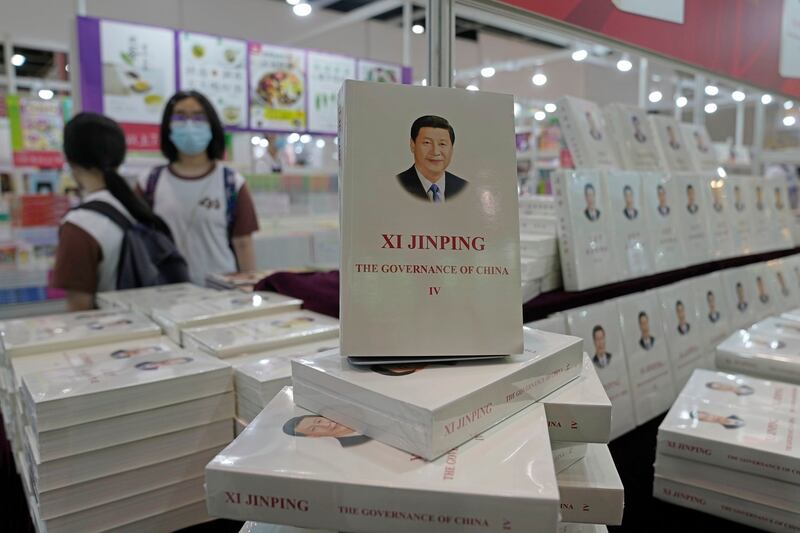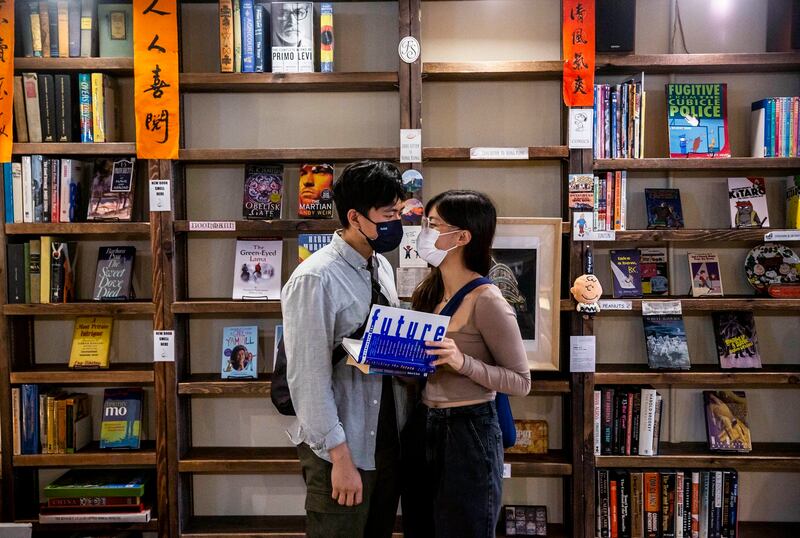Hong Kong authorities have removed hundreds of books from the shelves of the city's public libraries in recent weeks, including books referencing the 1989 Tiananmen massacre that ended weeks of pro-democracy protests around China, according to authors and the public library catalog.
In what some are calling it a "war on libraries," the government audit office and its Leisure and Cultural Services Department recently ordered librarians to ensure nothing in their collections could run afoul of a draconian national security law banning public criticism of both the local government and the ruling Chinese Communist Party.
The number of books on offer at Hong Kong's public libraries has fallen amid an ongoing cull of books that includes any titles referencing jailed media mogul Jimmy Lai and his now-shuttered Apple Daily newspaper, while compendiums of political cartoons by satirist Zunzi, whose column was recently axed by the Ming Pao newspaper, have also been taken off the shelves.
Chinese University of Hong Kong history lecturer Rowena He's book about former 1989 student leaders in exile, Tiananmen Exiles: Voices of the Struggle for Democracy in China, was among the political titles disappearing from public lending collections, according to Hong Kong-based editor Simon Cartledge.
"Another book that's disappeared from HK Public Libraries - Rowena He's Tiananmen Exiles," Cartledge said via his Twitter account on May 15. "Six copies available on 23 April. None today."
250 titles gone
A survey of the Hong Kong public library catalog by RFA's Cantonese Service found that around 250 titles had disappeared in the recent book cull, around three times as many as during a similar operation in 2021.
Just weeks ahead of the politically sensitive June 4 massacre anniversary, 146 titles about the massacre and the democracy movement that preceded it had been recently removed, compared with just 29 titles during the 2021 cull.
Keyword searches for "June 4," "Tiananmen Incident," "Tiananmen" and "1989" returned either zero results, or showed titles that were marked as unavailable.

The Chinese-language Ming Pao estimated in a May 15 report that 468 items featuring political themes or public figures had been removed from libraries since the end of 2020, including books and audiovisual materials.
Some of the politically sensitive keywords are similar to those used by censors in mainland China, and include references to the 1989 Tiananmen massacre and protest movement in the same year.
Some books about the 2014 Umbrella Movement and the 2019 protest movement against the loss of Hong Kong's promised freedoms remain, but only those penned by pro-China authors.
Pro-democracy politicians and authors, critics of the ruling Chinese Communist Party and historians are among those targeted in the latest round of censorship.
They include works by Occupy Central founder and former University of Hong Kong law professor Benny Tai, former pro-democracy lawmaker Claudia Mo, jailed barrister and former lawmaker Margaret Ng, Umbrella Movement leader Joshua Wong and 2010 Nobel Peace Prize winner Liu Xiaobo.
Informers
The general public have been actively encouraged by police to inform on any words or deeds that could be deemed subversive under the national security law, which criminalizes dissent in the form of words or deeds that "incite hatred" of the Hong Kong or Chinese authorities, leading to more than 40,000 tip-offs last year.
The move has prompted even pro-Beijing voices to speak out.
Businessman and former Chinese People's Political Consultative Conference committee member Lew Mon-hung likened the censorship to the book-burning carried out under Emperor Qin Shihuang (259–210 BC) or the political purges of the Cultural Revolution (1966-76).
He said the Hong Kong authorities appear to be acting over-zealously in a bid to demonstrate their leftist credentials.
"It is the worst practice to be leftist in everything, to try to gain credit and to demonstrate loyalty to the left," Lew said. "History has proven that ... there are no benefits."
"It is detrimental to ... the great rejuvenation of the Chinese nation."

Barrister Ronny Tong, who currently serves on the Hong Kong government’s Executive Council, agreed.
"I want libraries to abide by the law and safeguard national security, but there should also be some kind of balance, so that readers have access to more diversified sources of reference," Tong said.
"Libraries should base their judgements on common sense, on a sense of what is socially acceptable," he said. "I don't think there should be a list of banned books."
"Whether a book is considered criminal depends on a number of factors, including the intentions and behavior of the suspect."
‘Cultural Revolution in Hong Kong’
Current affairs commentator Chip Tsao said the book cull could mark what he termed "the start of the Cultural Revolution in Hong Kong," and appeared to agree with Lew that officials were overdoing the zeal.
"The frontline bureaucrats of the Hong Kong Special Administrative Region were trained in the colonial era," Tsao told Radio Free Asia. "They only know how to carry out orders from their superiors, with a list of books and a few names."
"They don’t understand the overall political situation in [mainland] China because they have only just joined the Chinese political family."
He added: "In many cases, mainland China can be dealt with flexibly."
An official who responded to requests for comment from the Leisure and Cultural Services Department declined to confirm whether all of Zunzi's books, or all books mentioning the Tiananmen massacre, had been removed from the shelves.
"From time to time, books that do not conform to the [direction of] development of the collection are reviewed and canceled," the official said. "Books whose contents are suspected of violating national security or Hong Kong laws will be removed immediately for review."
According to Tsao, officials could be acting in too much of a hurry to appease Beijing.
"They're still in the process of learning to be Chinese ... and they don't understand China's unspoken rules," he said. "And now there's a national security hotline for anyone to inform [on suspected violations]."
He said there are likely still "tens of thousands" of such books in people's private collections.
"If they regard these books that many people have in their homes as [similar to] illegal firearms, then there's little point in removing them from [libraries]," he said. "They should call for people to bring them out within the next three days, and then the Hong Kong Special Administrative Region government should burn them."
Translated by Luisetta Mudie. Edited by Malcolm Foster.
